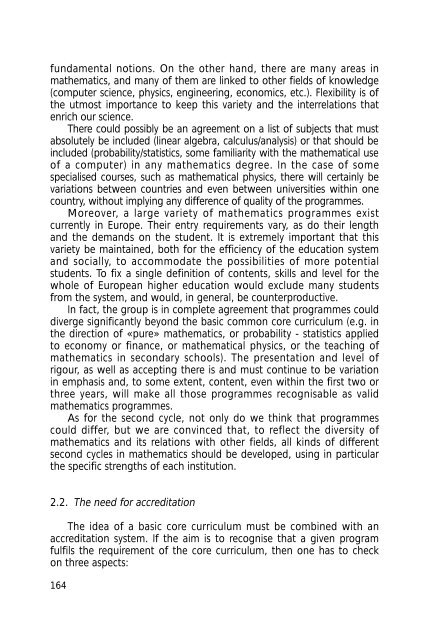Final Report Pilot Project - Relaciones Internacionales de la ...
Final Report Pilot Project - Relaciones Internacionales de la ...
Final Report Pilot Project - Relaciones Internacionales de la ...
Create successful ePaper yourself
Turn your PDF publications into a flip-book with our unique Google optimized e-Paper software.
fundamental notions. On the other hand, there are many areas in<br />
mathematics, and many of them are linked to other fields of knowledge<br />
(computer science, physics, engineering, economics, etc.). Flexibility is of<br />
the utmost importance to keep this variety and the interre<strong>la</strong>tions that<br />
enrich our science.<br />
There could possibly be an agreement on a list of subjects that must<br />
absolutely be inclu<strong>de</strong>d (linear algebra, calculus/analysis) or that should be<br />
inclu<strong>de</strong>d (probability/statistics, some familiarity with the mathematical use<br />
of a computer) in any mathematics <strong>de</strong>gree. In the case of some<br />
specialised courses, such as mathematical physics, there will certainly be<br />
variations between countries and even between universities within one<br />
country, without implying any difference of quality of the programmes.<br />
Moreover, a <strong>la</strong>rge variety of mathematics programmes exist<br />
currently in Europe. Their entry requirements vary, as do their length<br />
and the <strong>de</strong>mands on the stu<strong>de</strong>nt. It is extremely important that this<br />
variety be maintained, both for the efficiency of the education system<br />
and socially, to accommodate the possibilities of more potential<br />
stu<strong>de</strong>nts. To fix a single <strong>de</strong>finition of contents, skills and level for the<br />
whole of European higher education would exclu<strong>de</strong> many stu<strong>de</strong>nts<br />
from the system, and would, in general, be counterproductive.<br />
In fact, the group is in complete agreement that programmes could<br />
diverge significantly beyond the basic common core curriculum (e.g. in<br />
the direction of «pure» mathematics, or probability - statistics applied<br />
to economy or finance, or mathematical physics, or the teaching of<br />
mathematics in secondary schools). The presentation and level of<br />
rigour, as well as accepting there is and must continue to be variation<br />
in emphasis and, to some extent, content, even within the first two or<br />
three years, will make all those programmes recognisable as valid<br />
mathematics programmes.<br />
As for the second cycle, not only do we think that programmes<br />
could differ, but we are convinced that, to reflect the diversity of<br />
mathematics and its re<strong>la</strong>tions with other fields, all kinds of different<br />
second cycles in mathematics should be <strong>de</strong>veloped, using in particu<strong>la</strong>r<br />
the specific strengths of each institution.<br />
2.2. The need for accreditation<br />
The i<strong>de</strong>a of a basic core curriculum must be combined with an<br />
accreditation system. If the aim is to recognise that a given program<br />
fulfils the requirement of the core curriculum, then one has to check<br />
on three aspects:<br />
164


